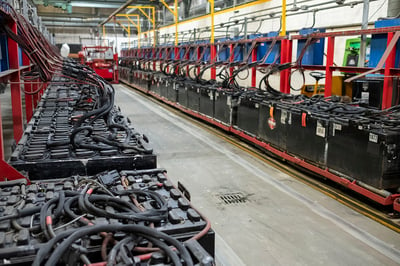 Good power technicians possess the complex scientific and electrical knowledge needed for optimal power management. Great power technicians understand that power is not a static, unchanging thing; instead, they engage with power management as a complex, dynamic process because they know how you manage forklift power affects your bottom line.
Good power technicians possess the complex scientific and electrical knowledge needed for optimal power management. Great power technicians understand that power is not a static, unchanging thing; instead, they engage with power management as a complex, dynamic process because they know how you manage forklift power affects your bottom line.
That’s why a great power tech can save you up to $4k a forklift by ensuring your forklift, battery and charger system are running at optimal capacity.
If your goal is to keep your plant working at maximum capacity with minimal disruptions, there are few experts as important to the process as the power technician.
When you’re hiring, how do you tell the difference between a good power tech and a great one?
The three vital characteristics that make a great power technician are their technical abilities, attitude, and entrepreneurial drive.
Here are some factors to consider when interviewing that will help you distinguish a merely good tech from a great one:
Measure Their Technical Abilities
It is absolutely crucial that the power technicians you hire have the skill sets and the technical knowledge to do the job. Maintaining a power system is one thing; maintaining a power system properly requires a great deal of electrical and scientific knowledge. Batteries are not just power sources; they are complex chemical and electrical systems, and many employees simply do not have the background or the knowledge they need to get maximum life out of each battery.
Good techs understand how batteries work and how to maintain them properly, but may rely more on their intuition to find potential issues and may not take scheduling as seriously as they should.
Great techs not only understand all the factors that can significantly shorten a battery’s life, they are data-focused and have a scheduling system in place to ensure that all forklift batteries get the attention they deserve within the correct timeframe. This can turn each forklift into an ATM machine, lowering your costs by 30 percent.
Hire for Attitude
Technical knowledge and ability are crucial. But when it comes to hiring decisions, you can’t underestimate the importance of attitude. This might seem contradictory -- if you’re hiring for technical abilities, how can you also be hiring for attitude? But the truth is that the two skills -- technical skills and attitude/people skills -- can and should be complementary. One good sign that you’ve found a great power technician to hire is that he or she possesses both.
However, if you have to prioritize one, prioritize attitude. A power technician can learn specific skills related to power management if under the right training and mentorship structure, but certain things -- like a proactive work approach, a customer-service oriented mindset, and a can-do attitude are much harder to teach. In other words: you can hire a turkey and teach it to climb a tree, but it’s a lot smarter to just hire a squirrel.
If it sounds challenging to find someone who has both the right attitude and the right technical skills, that’s because it is. But those people do exist: make it a priority to find them or work with a partner who’s already found them for you!
Look for Entrepreneurial Drive
By the very nature of the work they do, power technicians must be able to work independently. Sure, they may work as part of a team, but great power technicians need to be self-motivated, able to set priorities and determine proper maintenance schedules. In a big plant, power techs may work overnight shifts without direct supervision: you should be confident that the tech you hire can handle -- and even thrive under -- this kind of independence. To go a step further: you aren’t looking for a good technician who is fine with independence; you’re looking for a great technician who wants an independent entrepreneurial opportunity.
It will be the power technician’s job to take ownership of their own business, to grow their own customer base, and to participate in building their own success. As their employers, then, your job will be to supply your power techs with data about the batteries they maintain, as well as profit and loss information: this way, they can be fully equipped to independently “run their business.”
At the end of the day, your goal is to do what you do best: keep your plant working at maximum capacity by avoiding disruptions and getting the product shipped in a timely fashion. A power technician expertly taking charge of, and optimizing, power management allows you to concentrate on doing exactly that.


